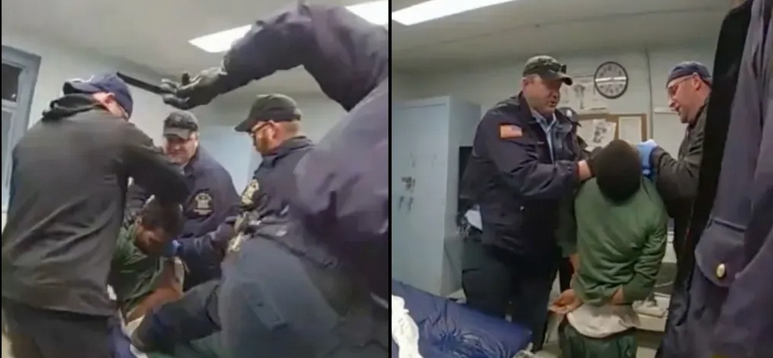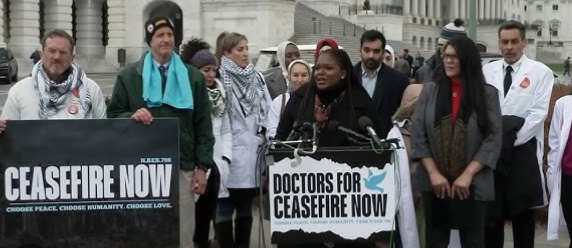Photos: Wikimedia Commons\The Voice\Twitter
Is the idea of “defunding the police” really as radically nonsensical as many politicians are pretending? In the following piece, writer Stephanie Williams explores the ambivalence toward reimagining policing–and altering bloated police budgets.
I recently read an article in the publication New Philosopher that opined over the reasons people fight for change.
It talked about how many who believe that change always happens in due course and that no matter how bad things get, if we just give it enough time—things eventually get better. It stressed further how many with this mindset expressed as much during the Civil Rights era further noting how it was this attitude by many white ministers that angered Martin Luther King Jr. and prompted him to write his famous “Letter from a Birmingham Jail something like ‘if only the oppressed would not allow their impatience to get in the way, “elderly xenophobes, racists, and sexists die out or certain politicians leave office, [and] time will gift us with a new, transformed day.”
I guess this is an easy position to take for those who have never been oppressed, despised and/or abused.
The author proceeded to highlight King’s retort to this position that noted change was not guaranteed to happen today or tomorrow unless people fight for it.
Some 60 years later, Black Lives Matter was born.
Many of us watched over the last couple of years as leaders on both sides of the aisle at the federal, state and local levels appeared to lose their minds when Black Lives Matter called for defunding the police on the heels of several high-profile murders of young Black people by officers and deputies across the country.

Certainly, amid the COVID-19 crisis, these indiscriminate killings of young Black people, of any people—though long-suffered and fought against in ebbs and flows over time—once again became too much for members of the Black community and others to bear.
But the radical idea of defunding the police—like letting Blacks attend white schools or move into white neighborhoods or give them weapons to fight as soldiers in the military once seen as untenable—saw even members of the Black community stammer and stutter as they tried to find the politically correct footing to respond to such a bold demand. ‘Uh…uh…uh…defund the police…uh…uh…uh…Now I certainly support this movement… but, uh…that’s a bridge too far.”
As noted last week, President Joe Biden successfully secured the majority of Black votes in the 2020 election even as he too decried the request to “defund,” and it seems to prove how committed he remains to the status quo regarding the police, the president makes sure to emphasize his position of support at every opportunity. Another way he has proven his support is by ensuring billions of dollars continue flowing into police coffers through every channel at his disposal even as he also designates token amounts to the concepts of community organizations playing a part in community-related police initiatives—the real purpose of the defunding call.
In the meantime, as the nation continues to equivocate, hem and haw over police funding, 203 Black Lives were taken by police in 2021 according to Newsweek proving not much has changed regarding police taking Black lives indiscriminately since the 2020 uprising—police funding continues to flow like a fireman’s hose without a shut-off valve and Black people continue to die.

Then, as if adding insult to injury, we learned in recent days that between 2010 and 2020 nearly 40,000 payments resulting from allegations of police misconduct were paid by 25 police agencies across the country totaling more than $3 billion according to a March 9, Washington Post report.
Keep in mind the report looked at only 25 of the approximate 17,985 police agencies in the country. Acknowledging police agencies vary in size, just consider the possibilities relative to the total amount of settlement payments were a complete assessment made of all the nation’s police agencies—it would be staggering.
One of the areas included in the report’s assessment was Riverside where a total of $77 million dollars in settlement payments were made during the study period.
Where is the outcry? All I hear are crickets.
It seems unconscionable that rather than reimagining policing, communities are willing to pay millions of dollars (billions nationally) and sacrifice untold lives being lost or damaged rather than seeking a better way—reimagining—redirecting funding away from the police and toward more purposeful and proactive ways to build relationships between police/deputies and the communities they serve.
Riverside County Sheriff’s Department has an annual budget totaling more than one billion dollars not including additional funding readily accessible through generous state and/or federal grants.
Things will never change unless agencies like Riverside and others in the inland region are in some way held accountable for their violations of human rights—how else can you describe misuse of force so egregious that every year there are millions of dollars in settlement costs paid by taxpayers—not including the salaries of a contingent of lawyers needed to negotiate settlement outcomes?
Maybe citizens should demand that every dollar paid in settling police use of force cases should be taken from the police/sheriff department’s budget and reallocated to local organizations working to reimagine policing in their communities–it would be a meaningful step toward “defunding the police.”
Of course, this is just my opinion. I’m keeping it real.
Stephanie Williams is executive editor of the IE Voice and Black Voice News. A longtime champion for civil rights and social justice in all its forms, she is also an advocate for government transparency and committed to ferreting out and exposing government corruption. Over the years Stephanie has reported for other publications in the inland region and Los Angeles and received awards from the California News Publishers Association for her investigative reporting and Ethnic Media Services for her weekly column, Keeping it Real. She also served as a Health Journalism Fellow with the USC Annenberg Center for Health Journalism. Contact Stephanie with tips, comments. or concerns at [email protected].







